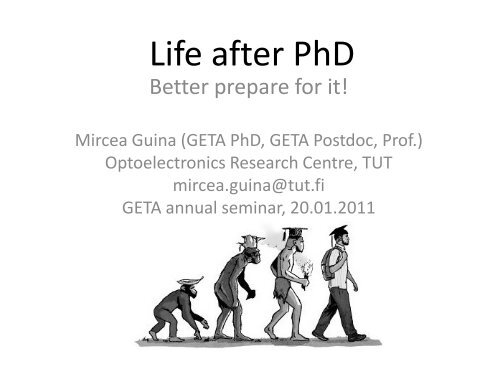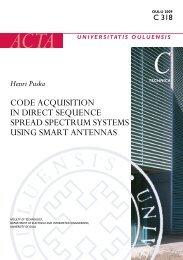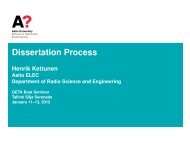Life after PhD - GETA
Life after PhD - GETA
Life after PhD - GETA
You also want an ePaper? Increase the reach of your titles
YUMPU automatically turns print PDFs into web optimized ePapers that Google loves.
<strong>Life</strong> <strong>after</strong> <strong>PhD</strong><br />
Better prepare for it!<br />
Mircea Guina (<strong>GETA</strong> <strong>PhD</strong>, <strong>GETA</strong> Postdoc, Prof.)<br />
Optoelectronics Research Centre, TUT<br />
mircea.guina@tut.fi<br />
<strong>GETA</strong> annual seminar, 20.01.2011
Introduction<br />
• 1999 – 2002: <strong>PhD</strong> Student / Funding: CIMO, <strong>GETA</strong><br />
• 2003 – 2005: PostDoc / Funding: <strong>GETA</strong><br />
• 2006 – 2008: Senior researcher / Funding: FP6<br />
• 2009 – 2013: Professor tenure / Funding: TEKES, (AKA, FP7)<br />
• 2005 – Cofounder and Managing Director of RefleKron Oy<br />
• Married, two kids + mother-in-low = very important work asset<br />
enabling entrepreneurship; sadly, she is not mentioned yet on the<br />
acknowledgment section of any of my papers…
Why bother to be involved in entrepreneurial<br />
activities while working at university<br />
• We are motivated by results and purpose regardless on the way we achieve these<br />
• It is hard to cut out opportunities which have opened <strong>after</strong> hard work<br />
• “Fun”<br />
• Ultimately money … (not an easy way; high-tech entrepreneurship involves high risk)<br />
• With proper environment (e.g. possibility to rent facilities during weekend time) one<br />
can combine entrepreneurship and academic activities (at least for a while).<br />
A man with a vision on<br />
high-tech:<br />
Prof. Markus Pessa<br />
Established MBE<br />
technology at TUT<br />
and ORC<br />
1991 2000 2003 2004<br />
2008 2009
Things to talk about<br />
• What to expect <strong>after</strong> <strong>PhD</strong><br />
• What to avoid in <strong>PhD</strong> life<br />
• Success factors<br />
• Career planning<br />
• Some conclusions
Why making a <strong>PhD</strong><br />
• Curiosity and desire to contribute to knowledge<br />
• Become an expert in the field, obtain an academic position,<br />
obtain fame in the community<br />
• Have access to state-of-the-art infrastructure and knowhow<br />
enabling entrepreneurship<br />
• Develop personal skills: independence, self-knowledge and<br />
confidence, professional networks, communication, negotiation…
What is the real need for highly<br />
educated people<br />
Unemployment at the moment of MSc graduation<br />
TTY Opiskelijapalvelut / Eeva Ylhäinen
Self-motivation<br />
Students’ motivation profiles<br />
Entrepreneur<br />
Scientist<br />
+<br />
Nothing<br />
better to do<br />
It is nice to<br />
learn more<br />
• All have same challenge <strong>after</strong> graduation: need to<br />
reinvent, figure out the next goal, get resources to<br />
accomplish it, be independent etc.
Motivation scenario for academic career<br />
Private<br />
life<br />
Funding, facilities,<br />
environment<br />
Research topic<br />
Private<br />
life<br />
Funding, facilities,<br />
entrepreneurship<br />
Research topic<br />
Purpose!<br />
Private<br />
life<br />
Funding, facilities,<br />
environment<br />
Success as a group<br />
<strong>PhD</strong> student<br />
PostDoc<br />
Professor<br />
Is our society supporting a career path in science<br />
Where is the academic freedom Do professors turn<br />
more and more into project writing “machines”<br />
… practice and lead research<br />
… higher level of purpose<br />
… fame and more opportunities
Prepare to do something else than science<br />
• In western world about 40% of <strong>PhD</strong> continue as<br />
postdoctoral researchers. 20% are still in academia<br />
<strong>after</strong> 5 years from graduation you need to acquire<br />
skills that could be used in industry<br />
• The first years <strong>after</strong> graduation are likely to have a<br />
major impact on professional career. Evaluate your<br />
options well in advance
Success factors<br />
Opportunities<br />
Mentoring<br />
Hard work<br />
Career planning
About hard work<br />
• If you expect to work 7.25 hours/day for 5 days a week it is<br />
unlikely that you will stand out of the <strong>PhD</strong>s crowd (exceptions<br />
could be related to extraordinary native intelligence, karma,<br />
prayers and other possible mystical approaches … )<br />
• Hard work leads to more opportunities which lead to even<br />
harder work resulting in more opportunities etc. you need to<br />
find a balance<br />
• Be perseverant in getting things finished but review the output<br />
periodically and adjust the goals<br />
“Perseverance is a great element of success. If you only knock<br />
long enough and loud enough at the gate, you are sure to wake<br />
up somebody.“ Henry Wadsworth Longfellow<br />
“Success is dependent upon the glands; sweat glands."<br />
Zig Ziglar
About opportunities<br />
“Opportunity is missed by most people because it comes dressed in overalls and looks<br />
like work." Thomas Edison<br />
• Expose your ideas to criticism and let other people know what<br />
your thoughts are understand your value proposition<br />
• Opportunities are linked to collaboration. “It takes 2 to tango” but<br />
it might require 20 to get a new concept proved in the lab!<br />
• Do more than research work: organize courses, enroll in<br />
professional organization, build your professional network<br />
• Get involved at early stage in writing project proposals and grant<br />
applications<br />
• Challenge your environment in a constructive way; be proactive<br />
and give feedback to the others (good leaders value receiving<br />
even negative feedback; bad leaders perceive criticism like a<br />
threat); there is nothing much you can lose as a <strong>PhD</strong> student …
About the mentor<br />
• Having a mentor is beneficial for the scientific career<br />
• Does not always need to be your <strong>PhD</strong> supervisor<br />
• The ideal role is to guide the professional growth such that<br />
success is limited only by your ability to accomplish specific tasks<br />
• Apply common sense in following advices<br />
• Figure out the profile of your supervisor and act in consequence<br />
- Is he the role-model<br />
- Are you regarded just like one more tool to write papers which are used to<br />
attract money to be used for writing more papers<br />
- Supervisor might provide a falls image of what you are (in the best case,<br />
overconfidence driven by group politics , e.g. “In my team I have the most<br />
brilliant students so I deserve more money to keep these valuable people ” )
About career planning<br />
• You can not plan your life too much in advance but you can prepare<br />
for different options<br />
• Define the vision for what you want to achieve in professional life<br />
• Map out your options and prepare for the requirements at different<br />
career stages (e.g. for ERC starting grant you need to have papers<br />
published without your <strong>PhD</strong> advisor in the author list)<br />
• Match your personality, values, beliefs, skills and interests to possible<br />
options<br />
• Self-marketing Which are your strong points that you can promote<br />
What do you need to improve
Some conclusions<br />
• <strong>PhD</strong> studies should be driven by curiosity and desire to make a<br />
difference (although most of the time you don’t make it)<br />
• The path towards accomplishing a <strong>PhD</strong> has different values in<br />
itself. Amongst valuable things you might learn: manage<br />
complicated problems, be perseverant, be independent, selfknowledge,<br />
handle stress. There are good things to learn even<br />
from bad experiences if you keep your mind open<br />
• Stand out from the crowed<br />
• Graduation comes with certain “normal” feelings of uncertainty,<br />
frustration, anxiety. This is just how our brain tells that we need<br />
to keep moving<br />
• Opportunities are there for those prepared to see and grasp<br />
them
… more conclusions<br />
• Apparently there is no longer a big difference between<br />
work environment in universities and companies; this<br />
applies to funding, process tools, short term view on<br />
development, types of skills, job security etc.<br />
• Finding the “next big step” is a complex process. Plan your<br />
next career step well before the graduation<br />
• Try to learn from and stay close to those who are<br />
successful. The “success attraction law” tells that you will<br />
become successful yourself<br />
• Be patient; it takes time to accomplish true (recognized and<br />
sustainable) success<br />
• Be positive and don’t give up easy; attitude could make a<br />
big difference<br />
• Don’t forget to enjoy the work you do. Whatever that is,<br />
do it with passion!<br />
“I never did a day's work in my life. It was all fun.”<br />
Thomas Alva Edison
6th International Summer School<br />
‘New Frontiers in Optical Technologies’<br />
Tampere, 8-12 August 2011<br />
Supported by <strong>GETA</strong> since the beginning<br />
in 2001<br />
http://www.orc.tut.fi/school.html<br />
Topics<br />
- Nanophotonics and metamaterials<br />
- Semiconductor technology for nanophotonics<br />
- Photovoltaics<br />
- Biophotonics<br />
- Laser amplifiers<br />
- Entrepreneurship<br />
Lecturers (partial list)<br />
Prof. Robert Boyd, Rochester<br />
Prof. Walter Pfeiffer, Bielefeld<br />
Prof. Pallab Battacharya, Michigan<br />
Prof. Eli Kapon, EPFL<br />
Prof. Mark Hopkinson<br />
Dr. Wladek Walukiewicz, Berkeley Nat. Lab.<br />
Dr. Milton Chang<br />
Dr. Rüdiger Paschotta







